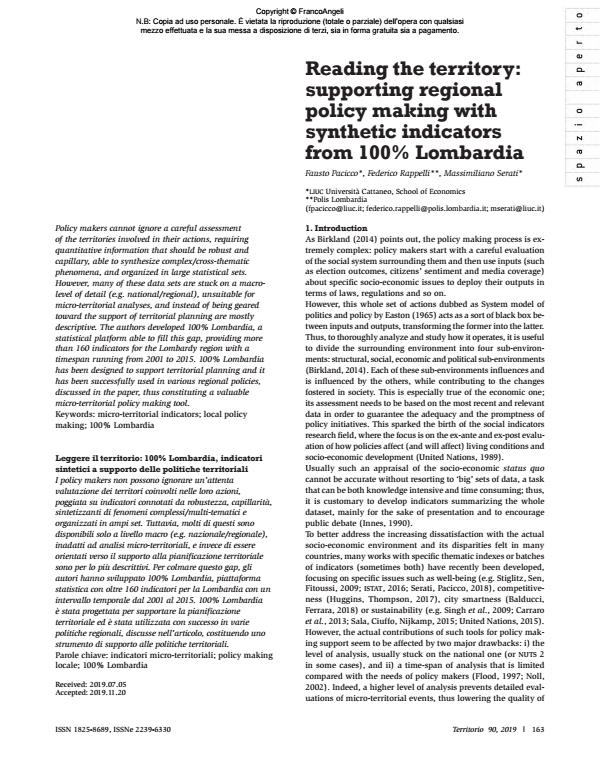Reading the territory: supporting regional policy making with synthetic indicators from 100% Lombardia
Titolo Rivista TERRITORIO
Autori/Curatori Fausto Pacicco, Federico Rappelli, Massimiliano Serati
Anno di pubblicazione 2020 Fascicolo 2019/90
Lingua Inglese Numero pagine 16 P. 90-178 Dimensione file 525 KB
DOI 10.3280/TR2019-090018
Il DOI è il codice a barre della proprietà intellettuale: per saperne di più
clicca qui
Qui sotto puoi vedere in anteprima la prima pagina di questo articolo.
Se questo articolo ti interessa, lo puoi acquistare (e scaricare in formato pdf) seguendo le facili indicazioni per acquistare il download credit. Acquista Download Credits per scaricare questo Articolo in formato PDF

FrancoAngeli è membro della Publishers International Linking Association, Inc (PILA), associazione indipendente e non profit per facilitare (attraverso i servizi tecnologici implementati da CrossRef.org) l’accesso degli studiosi ai contenuti digitali nelle pubblicazioni professionali e scientifiche.
Policy makers cannot ignore a careful assessment of the territories involved in their actions, requiring quantitative information that should be robust and capillary, able to synthesize complex/cross-thematic phenomena, and organized in large statistical sets. However, many of these data sets are stuck on a macrolevel of detail (e.g. national/regional), unsuitable for micro-territorial analyses, and instead of being geared toward the support of territorial planning are mostly descriptive. The authors developed 100% Lombardia, a statistical platform able to fill this gap, providing more than 160 indicators for the Lombardy region with a timespan running from 2001 to 2015. 100% Lombardia has been designed to support territorial planning and it has been successfully used in various regional policies, discussed in the paper, thus constituting a valuable micro-territorial policy making tool.
I policy makers non possono ignorare un’attenta valutazione dei territori coinvolti nelle loro azioni, poggiata su indicatori connotati da robustezza, capillarità, sintetizzanti di fenomeni complessi/multi-tematici e organizzati in ampi set. Tuttavia, molti di questi sono disponibili solo a livello macro (e.g. nazionale/regionale), inadatti ad analisi micro-territoriali, e invece di essere orientati verso il supporto alla pianificazione territoriale sono per lo più descrittivi. Per colmare questo gap, gli autori hanno sviluppato 100% Lombardia, piattaforma statistica con oltre 160 indicatori per la Lombardia con un intervallo temporale dal 2001 al 2015. 100% Lombardia è stata progettata per supportare la pianificazione territoriale ed è stata utilizzata con successo in varie politiche regionali, discusse nell’articolo, costituendo uno strumento di supporto alle politiche territoriali.
Parole chiave:Indicatori micro-territoriali; policy making locale; 100% Lombardia
- Shaping the local business structure: drivers of firm location at the municipal level Fausto Pacicco, Massimiliano Serati, Andrea Venegoni, in Spatial Economic Analysis /2025 pp.484
DOI: 10.1080/17421772.2024.2337902
Fausto Pacicco, Federico Rappelli, Massimiliano Serati, Reading the territory: supporting regional policy making with synthetic indicators from 100% Lombardia in "TERRITORIO" 90/2019, pp 90-178, DOI: 10.3280/TR2019-090018